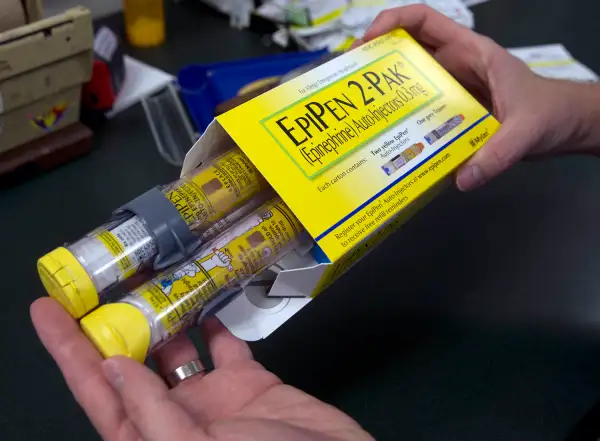Here's Mylan's Latest Strategy to Make You Shut Up about High EpiPen Prices

The EpiPen price-gouging scandal, in which public outcry drove Mylan Pharmaceuticals to offer bigger discounts for its $600 life-saving medication while also introducing a cheaper generic alternative, is not going away. Members of Congress have pressed Mylan to release documents concerning EpiPen price hikes, and company CEO Heather Bresch will appear before a House oversight panel next week to testify about the matter.
Now, it has come to light that Mylan is pursuing a strategy that would keep profits from EpiPen high, while ingeniously eliminating upfront costs to consumers. In fact, Mylan was quietly pushing this initiative months before it came under widespread fire this past summer for outrageous EpiPen price increases.
The New York Times reports that late last year, an effort supported by Mylan was launched in earnest to get the EpiPen placed on the list of preventive services that must be covered without additional cost by all health insurance plans in America. The list includes things like hearing screenings for newborns and immunization vaccines for children up to age 18.
If and when epinephrine auto-injection systems like EpiPen were placed on the list, Mylan "would be able to continue charging high prices for the product without patients complaining about the cost," the Times explains.
Read Next: Cheaper EpiPen Alternatives You Can Buy Right Now…Plus More Coming Soon
EpiPens are prescribed to people with serious allergies; the device can be used to fight off life-threatening anaphylaxis that can occur due to an allergic reaction. Thus far, no prescription medications like EpiPen are on the preventive services list. But Mylan has been spearheading a campaign to lobby federal authorities to get EpiPen on the list. Groups funded by Mylan have reached out to lawmakers making just this argument.
A new article in the American Journal of Medicine also focuses on the fact that "classifying epinephrine auto-injectors as preventive would improve outcomes... and save lives." A draft of the article was produced by a consulting firm funded by Mylan, and the byline for the article is Dr. Leonard Fromer, who worked as a paid consultant for the pharmaceutical giant as recently as last year.
[UPDATE: A Mylan representative reached out to Money offering the following clarification regarding Dr. Fromer's role in the article mentioned above: "Although Dr. Fromer has served as a consultant for Mylan in the past, he was not paid by Mylan to serve in an authorship role. Dr. Fromer served as the lead author of, “Prevention of anaphylaxis: the role of the epinephrine auto-injector,” and had full editorial control of the paper (including concepting, drafting and editing). Mylan provided third-party support to assist Dr. Fromer with the development process; however, following the International Committee of Medical Journal Editors criteria for authorship, all content was his own, not ghost authored."]
The gist is that if the campaign to get EpiPen on the preventive list succeeds, consumers who have been hit with 500% price increases might get their EpiPens fully covered by insurance, without even a copay, let alone a bill of $600+ per two-pack. This would be wonderful, especially to parents who are considering dangerous alternatives—including the accepting the potentially deadly risk of foregoing them entirely—because of outrageously expensive EpiPens. Lives would undoubtedly be saved.
At the same time, Mylan executive pay packages and profits could theoretically continue to be sky high as the company would no longer face as much public pressure to lower prices. Mylan could continue charging high prices for EpiPens, but it would likely be insurers and government funds covering the bill, not individuals getting EpiPen prescriptions filled.
Read Next: 21 Incredibly Disturbing Facts About High Prescription Drug Prices
“In a way, it is brilliant,” Rachel E. Sachs, a law professor specializing in public health policy at Washington University in St. Louis, told the Times regarding Mylan's strategy to get EpiPen on the preventive list. “We are all seeing them for what they are — the poster child for high drug prices right now, but they don’t want to be. And this tactic is nothing but a self-serving move, not a public-regarding one.”
What's more, ultimately, if the EpiPen does wind up on the preventive list, people might not have to pay directly out of pocket for their EpiPens, but the money flowing to Mylan will have to come from somewhere. Most likely, it'll be a collective effort, and we'll all pay up in the form of higher health insurance premiums.
